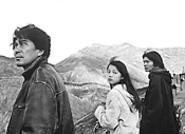The movie opens with Kozue (Aoi Miyazaki), an adorable little girl, waving goodbye to her mother before boarding a bus with her older brother, Naoki (Masaru Miyazaki). It's an idyllic opening, but the idyll is short-lived. Suddenly we see the bus parked in an empty lot, a dead man lying a few feet away; another man emerges and tries to run, but is shot and killed within seconds.
It turns out that a lunatic (Go Riju) has hijacked the bus and killed everyone aboard except Kozue, Naoki, and the driver, Makoto (Koji Yakusho, star of Shall We Dance?, the most successful Japanese film ever released in the U.S.). The police, led by a dour, Christopher Walkenish inspector (Yutaka Matsushige), manage to end the siege just as the madman is aiming for the children.
This is all over 15 minutes into the film; we won't see any more onscreen violence for another three hours or so. But these horrific events understandably have a profound effect on the three survivors, throwing their lives into a chaos from which they may never emerge. The bus driver, unable to continue as though nothing has happened, simply disappears, leaving behind his wife and extended family. The children -- already so close that they seem to be telepathically linked -- withdraw further into their private two-person world. They cease to speak; when their mother runs away with another man and their father is killed in an accident, they are left alone in their big house, living off of insurance money, unsupervised by adults.
Two years pass: Makoto, the bus driver, returns and tries to pick up what's left of his life. But at the very moment he shows up, a serial killer starts murdering young women. It may -- or may not -- be a coincidence, but the resulting gossip scandalizes his family. Not sure where else to go, he shows up at the children's door and announces that he's moving in for a while.
The kids are now perhaps 12 and 15, and the house is predictably a pigsty. Makoto becomes de facto nanny/tutor/cook/maid, gamely trying to create some kind of livable household. He clearly feels a responsibility to the kids, as though his inability to protect them from the madman has led to their current lifestyle.
All of this is basically act one of Eureka. In act two, this threesome becomes more and more of a family, albeit a highly dysfunctional one; and it's joined by Akihiko (Yohichiroh Saitoh), a college student vaguely related to the kids, who has been sent by the other relatives to check up on them during his vacation. Act three comes full circle, as Makoto buys an old bus and takes his impromptu family on a therapeutic road trip, including a visit to the scene of the original trauma.
Aoyama's pacing is a mixed blessing. On the one hand, he keeps things interesting, aided in no small part by Yakusho's perfectly low-key, restrained performance and by young Aoi Miyazaki's ability to be expressive even while appearing totally impassive and never speaking. Masaki Tamra's gorgeous black-and-white cinematography is also a big plus. Still, one wonders if the film might not have worked as well or even better at, say, two-thirds the length. Aoyama has ventured a great risk: Rather than use traditional cinema shorthand, he has related his tale with a leisurely narrative style usually limited to the novel. When used well, as it is here, this mode of storytelling has powerful advantages: We spend so much time with the characters, experience so much in common with them, that we are seduced into caring, despite (in the case of the children) their constant emotional remoteness. We quite naturally feel by the end that we have lived a lifetime with them.
The risk is that the very thought of a nearly four-hour film, with its major time commitment and threat of boredom, will alienate Eureka's audience before they make it through the door -- that is, that people will simply not bother to show up. It's an understandable reaction, but in this case, it would be a shame: Eureka is, in its very long run, well worth the investment of time.










